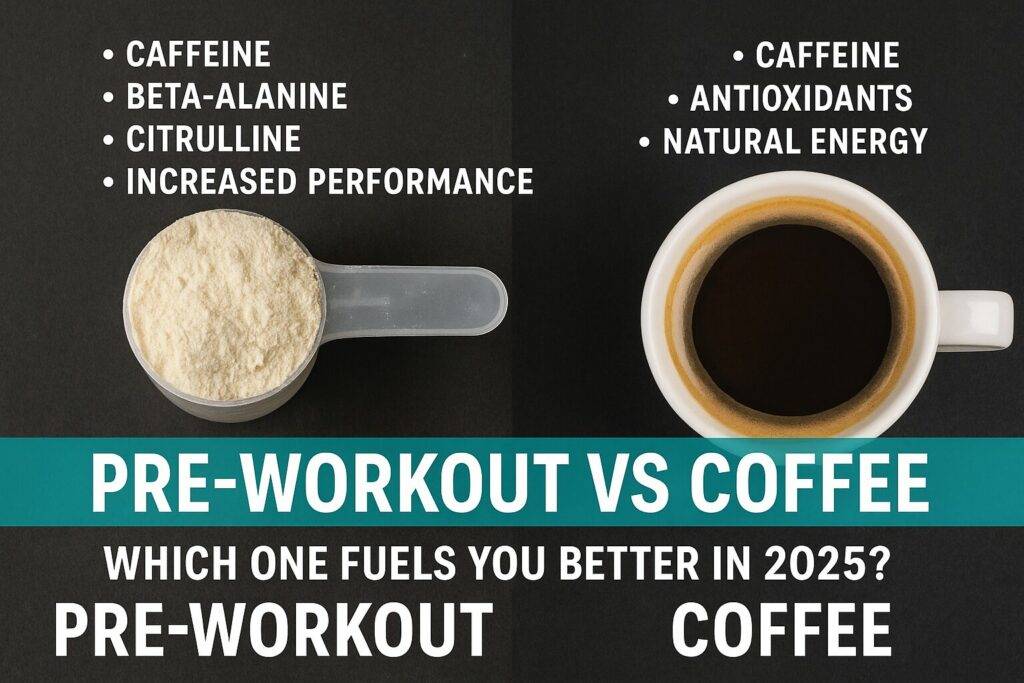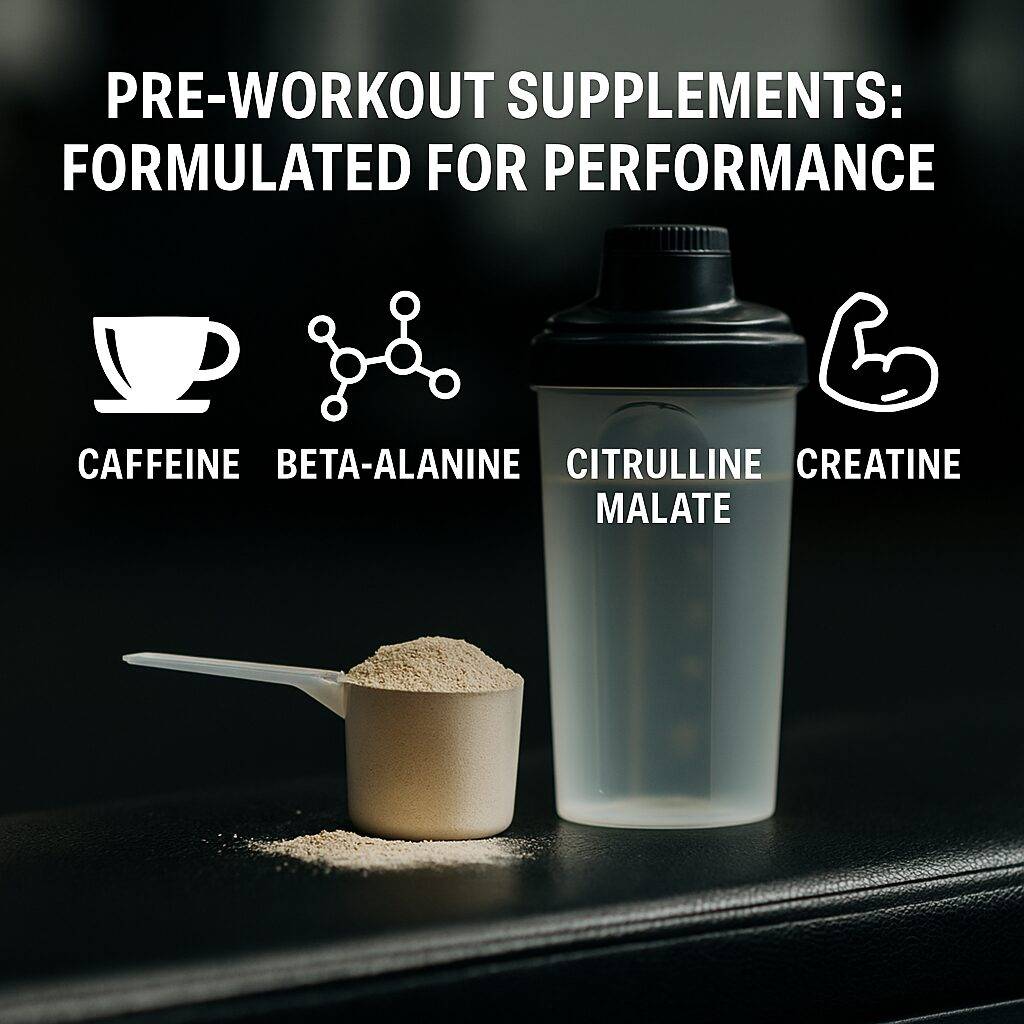Whether you’re an early-morning lifter or a late-night warrior, choosing the right pre-training fuel matters. Two options dominate the fitness world: pre-workout supplements and a simple cup of coffee. While both offer energy-boosting benefits, the real question is — in the debate of pre-workout vs coffee, which one actually helps you train harder, longer, and smarter?
In this complete 2025 comparison guide, we’ll break down the ingredients, effects, use cases, pros, cons, expert tips, and real-life examples to help you choose your perfect pre-training partner.

Table of Contents
Toggle1. What’s Inside – Coffee vs Pre-Workout Ingredients
Pre-Workout Supplements: Formulated for Performance
Modern pre-workouts are complex blends of energy, performance, and mental boosters. Common ingredients include:
- Caffeine: 150–300mg for stimulant-driven energy
- Beta-Alanine: Delays fatigue by buffering lactic acid
- Citrulline Malate: Improves blood flow and muscle pump
- L-Theanine: Calms caffeine stimulation, sharpens focus
- Creatine: (optional) Enhances strength and power
Want to experience a proven blend of energy and performance boosters? 👉 Check out this popular beginner-friendly pre-workout formula.
Coffee: Simple and Natural
Coffee provides 80–100mg of caffeine per 8oz cup and contains antioxidants. It’s natural, accessible, and budget-friendly — but lacks performance enhancers like beta-alanine or citrulline.
Looking for a clean energy boost from coffee? 👉 Explore workout-friendly espresso blends here.
2. Pre-Workout vs Coffee – Energy Boost Comparison
Both contain caffeine, but how they deliver energy is different:
- Pre-Workout: Smoother onset, longer-lasting energy, thanks to ingredients like L-theanine and slow-absorbing forms of caffeine
- Coffee: Fast spike, fast crash — may cause jitters and increased heart rate, especially on an empty stomach
Tip: If you’re caffeine-sensitive, try pre-workouts with L-theanine or go for stimulant-free blends. Coffee may hit harder without those calming agents.
3. Strength, Pump & Endurance: Which Supports Performance Better?
Pre-Workout: Purpose-Built for Training
Beta-alanine delays muscle fatigue, citrulline improves blood flow, and creatine (if included) supports strength and recovery. Together, they elevate both short-term and long-term training quality.
Coffee: Mental Boost Only
Coffee gives mental alertness, but lacks physical support ingredients. It doesn’t increase muscular endurance or boost blood flow the way a performance formula does.
4. Mental Focus and Workout Drive
Pre-workouts often include nootropics like L-tyrosine or Alpha GPC, which enhance dopamine and acetylcholine levels — improving focus, reaction, and motivation. Coffee increases alertness but may cause anxiety or loss of focus under stress.
5. Pre-Workout vs Coffee – Cost, Convenience, and Simplicity
| Factor | Pre-Workout | Coffee |
|---|---|---|
| Caffeine content | 150–300mg | 80–100mg |
| Performance ingredients | Yes (Beta-Alanine, Citrulline, Creatine) | No |
| Cost per serving | $1.00–$2.00 | $0.20–$0.80 (home brewed) |
| Ease of preparation | Requires shaker & scoop | Quick to brew or grab |
| Digestive comfort | Usually well-tolerated | Can irritate the stomach |
6. Pre-Workout vs Coffee for Different Training Styles
For Strength Training and Bodybuilding
Pre-workouts win with beta-alanine, citrulline, and creatine to support strength output and pump.
For HIIT and Endurance
Pre-workouts enhance VO2 max, blood flow, and stamina. Coffee wears off mid-session unless dosed carefully.
For Yoga, Pilates, or Low-Impact Workouts
Coffee is preferred — gentler and more calming. Pre-workouts may be overkill unless stimulant-free.
7. Coffee vs Pre-Workout – Real User Experiences
Mike (Heavy Lifter)
Mike lifts after work. Coffee made him tired mid-session. Pre-workout with 200mg caffeine + beta-alanine keeps him energized through squats and deadlifts.
Sarah (Cardio & Yoga)
Sarah prefers a morning cup of black coffee before her 5K run and yoga. She finds pre-workout “too buzzy” for her routine.
8. What Fitness Coaches Say About Pre-Workout vs Coffee
“For high-performance training, coffee doesn’t cut it. Pre-workouts give you focus, strength, and recovery support.” – Jake B., Certified Strength Coach
“I recommend coffee for beginners or light activity. Once training intensity rises, switch to a clean pre-workout.” – Stephanie R., Personal Trainer
9. A Simple Decision Framework
- Light workout & morning? Try coffee
- Heavy lifting / HIIT? Use pre-workout
- Training fasted? Coffee (black) is better
- Evening session? Stimulant-free pre-workout
- Low budget? Coffee wins
10. Long-Term Results – Pre-Workout vs Coffee
In the long run, pre-workout supplements give you more: enhanced recovery, increased training volume, and better focus. They’re built for serious athletes and consistent lifters. Coffee, however, works well for maintaining routine and daily energy — especially if you prefer natural simplicity.
11. Final Verdict – Which One Should You Use?
Still torn between pre-workout vs coffee? Here’s the summary:
- Go with coffee if you train light, fasted, early in the day, or on a budget.
- Choose pre-workout if you train hard, want better pumps, and value performance ingredients like beta-alanine, creatine, and citrulline.
12. Frequently Asked Questions
12.1 Is coffee good enough for intense training?
For light or moderate workouts, yes. For intense lifting or endurance training, pre-workouts offer more complete support.
12.2 Can I combine coffee with pre-workout?
It’s possible, but risky. Don’t exceed 400mg caffeine per day. Always monitor your total intake to avoid overstimulation.
12.3 Which one is better for weight loss?
Coffee supports fasting and metabolism. Pre-workouts help burn more calories by increasing training intensity. Both can help when used properly.
👉 Want to Try Pre-Workouts That Actually Work?
See our Top Pre-Workout Picks for 2025 →
🔗 Related Guides
Disclosure: As an Amazon Associate, HealthFitHub earns from qualifying purchases.

